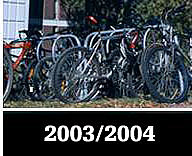|
|
|
Criminology and Criminal Justice
Institute of Criminology and Criminal Justice Faculty of Public Affairs
and Management
This section presents the requirements for:
Graduation Requirements
In addition to the requirements listed below,students must satisfy:
- the University regulations (see the Academic Regulations of the
University section of this Calendar),
- the common regulations applying to all B.A. students including those
relating to First-Year Seminars. The B.A. Breadth requirement is waived
for students in Criminology and Criminal Justice (see Academic Regulations
and Requirements for the Bachelor of Arts Degree).
Students should consult with the Institute when selecting courses and
planning their program.
Maximum Number of CCJ Credits
The total number of Criminology and Criminal Justice courses in the B.A.
and B.A.(Honours) program may not exceed 11.5 (B.A.) and 15.0 (B.A.Honours).
Consult the Institute if clarification is required.
Program Requirements
Criminology and Criminal Justice
B.A. Honours (20.0 credits)
Students in this program choose to follow one of the three concentrations.
The selection must take place before second year status is achieved.
CCJ with Concentration in Law
B.A. Honours (20.0 credits)
A. Credits Included in the Major CGPA:(13.0 credits):
- 2.5 credits in LAWS 1000 [1.0], LAWS 2004 [1.0], LAWS 3907;
- 0.5 credit from: LAWS 3305 or LAWS 3306;
- 1.0 further credits in Law at t he 2000-level or higher;
- 1.5 further credits in Law at the 3000-level or higher;
- 2.0 credits in PSYC 1001, PSYC 1002, PSYC 2400, PSYC 3402;
- 1.0 credit in:SOCI 1000 [1.0];
- 1.0 credit in SOCI 2505, SOCI 2701;
- 0.5 credit in either: SOCI 3703 or SOCI 3808;
- 1.0 credit from: CRCJ 3000 [1.0] or Approved CCJ Electives at the
3000-level or higher (See Note 2);
- 1.0 credit from: CRCJ 3901 [1.0] or Approved CCJ Electives at the
3000-level;
- 1.0 credit from: CRCJ 4908 [1.0] or Approved CCJ Electives at the
4000-level;
B. Credits Not Included in the Major CGPA (7.0 credits):
- 7.0 credits in free electives.
Notes
- The course CRCJ 3901 may not be repeated.
- See Note 2 under Course Categories for Criminology
and Criminal Justice below regarding maximum permissible number
of CCJ electives.
CCJ with Concentration in Psychology
B.A. Honours (20.0 credits)
A. Credits Included in the Major CGPA (13.5 credits):
- 2.0 credits in LAWS 1000 [1.0], LAWS 2004 [1.0];
- 0.5 credits from: LAWS 3305 or LAWS 3306;
- 3.0 credits in PSYC 1001, PSYC 1002, PSYC 2400, PSYC 3402, PSYC 3000
[1.0];
- 1.0 credit in (PSYC 2001 and PSYC 2002) or in PSYC 2000 [1.0];
- 1.0 credit in Psychology at the 2000-level or higher;
- 0.5 credit in Psychology at the 3000-level or higher;
- 1.0 credit in: SOCI 1000 [1.0];
- 1.0 credit in: SOCI 2505, SOCI 2701;
- 0.5 credit from: SOCI 3703 or SOCI 3808;
- 1.0 credit from: CRCJ 3000 [1.0] or PSYC 3400 [1.0] or Approved CCJ
Electives at the 3000-level or higher (See Note 2);
- 1.0 credit from: CRCJ 3901 [1.0] or Approved CCJ Electives at the
3000-level;
- 1.0 credit from: CRCJ 4908 [1.0] or Approved CCJ Electives at the
4000-level;
B. Credits Not Included in the Major CGPA (6.5 credits):
- 6.5 credits in free electives.
Note: see note entitled Maximum Number of CCJ Credits above
the Program Requirements section, regarding the maximum permissible Criminology
credits for your program.
CCJ with Concentration in Sociology
B.A. Honours (20.0 credits)
A. Credits Included in the Major CGPA:(13.0 credits):
- 2.0 credits in: LAWS 1000 [1.0], LAWS 2004 [1.0];
- 0.5 credits from: LAWS 3305 or LAWS 3306;
- 2.0 credits in: PSYC 1001, PSYC 1002, PSYC 2400, PSYC 3402;
- 1.0 credit in: SOCI 1000 [1.0];
- 2.0 credits in Sociology SOCI 2003 [1.0], SOCI 2505, SOCI 2701;
- 0.5 credit from: SOCI 3703 or SOCI 3808;
- 1.0 credit in Sociology at the 2000-level or higher;
- 1.0 credit in Sociology at the 3000-level or higher;
- 1.0 credit from: CRCJ 3000 [1.0] or SOCI 3700 [1.0] or Approved CCJ
Electives at the 3000-level or higher (See Note 2);
- 1.0 credit from: CRCJ 3901 [1.0] or Approved CCJ Electives at the
3000-level;
- 1.0 credit from: CRCJ 4908 [1.0] or Approved CCJ Electives at the
4000-level;
B. Credits Not Included in the Major CGPA (7.0 credits):
- 7.0 credits in free electives.
Notes for all Concentrations
- For Requirement 11 in each concentration, registration in the Honours
Research Project CRCJ 4908 requires a Major CGPA of at least 10.00.
- Sociology SOCI 3700 may be substituted for CRCJ 3000 for students
doing their Concentration in Sociology. Psychology PSYC 3400 may be
substituted for students doing their Concentration in Psychology.
- In Item 8 in the Concentration in Sociology, SOAN 2005 [1.0] or SOCI
4006 [1.0] is highly recommended.
- See note entitled Maximum Number of CCJ Credits above the Program
Requirements section regarding the maximum permissible Criminology credits
for your program.
Criminology and Criminal Justice
B.A. General (15.0 credits)
Students in this program choose to follow one of the three concentrations.
The selection must take place before second year status is achieved.
CCJ with Concentration in Law
B.A. General (15.0 credits)
A. Credits Included in the Major CGPA:(10.0 credits):
- 2.0 credits in LAWS 1000 [1.0], LAWS 2004 [1.0];
- 0.5 credit from: LAWS 3305 or LAWS 3306;
- 2.0 further credits in Law at the 2000-level or higher;
- 2.0 credits in PSYC 1001, PSYC 1002, PSYC 2400, PSYC 3402;
- 1.0 credit in: SOCI 1000 [1.0];
- 1.0 credit in SOCI 2505, SOCI 2701;
- 0.5 credit from: SOCI 3703 or SOCI 3808;
- 1.0 credit from: CRCJ 3901 [1.0] or Approved CCJ Electives at the
3000-level;
B. Credits Not Included in the Major CGPA (5.0 credits):
- 5.0 credits in free electives.
Note: see note entitled Maximum Number of CCJ Credits above
the Program Requirements section regarding the maximum permissible Criminology
credits for your program.
CCJ with Concentration in Psychology
B.A. General (15.0 credits)
A. Credits Included in the Major CGPA (10.5 credits):
- 2.0 credits in LAWS 1000 [1.0], LAWS 2004 [1.0];
- 0.5 credits from: LAWS 3305, LAWS 3306;
- 2.0 credits in PSYC 1001, PSYC 1002, PSYC 2400, PSYC 3402;
- 1.0 credit in (PSYC 2001 and PSYC 2002) or in PSYC 2000 [1.0];
- 1.5 credits in Psychology at the 2000-level or higher;
- 1.0 credit from:SOCI 1000 [1.0];
- 1.0 credit in: SOCI 2505, SOCI 2701;
- 0.5 credit from: SOCI 3703 or SOCI 3808;
- 1.0 credit from: CRCJ 3901 [1.0] or Approved CCJ Electives at the
3000-level;
B. Credits Not Included in the Major CGPA (4.5 credits):
- 4.5 credits in free electives.
Note: see note entitled Maximum Number of CCJ Credits above
the Program Requirements section regarding the maximum permissible Criminology
credits for your program.
CCJ with Concentration in Sociology
B.A. General (15.0 credits)
A. Credits Included in the Major CGPA:(10.0 credits):
- 2.0 credits in: LAWS 1000 [1.0], LAWS 2004 [1.0];
- 0.5 credits from: LAWS 3305 or LAWS 3306;
- 2.0 credits in: PSYC 1001, PSYC 1002, PSYC 2400, PSYC 3402;
- 1.0 credit from: SOCI 1000 [1.0];
- 2.0 credits in Sociology SOCI 2003 [1.0], SOCI 2505, SOCI 2701;
- 0.5 credit from: SOCI 3703 or SOCI 3808;
- 1.0 credit in Sociology at the 2000-level or higher;
- 1.0 credit from: CRCJ 3901 [1.0] or Approved CCJ Electives at the
3000-level;
B. Credits Not Included in the Major CGPA (5.0 credits):
- 5.0 credits in free electives.
Note: see note entitled Maximum Number of CCJ Credits above
the Program Requirements section regarding the maximum permissible Criminology
credits for your program.
Field Placement Practicum
The Field Placement Practicum (CRCJ 3901) is offered at the 3000-level
to students in CCJ programs. Students complete a 1.0 (or 2.0) credit Field
Placement Practicum course during the fall/winter session. To be eligible
for the Practicum students must have completed at least 9.0 credits, including
all of the 1000-and 2000-level requirements in the Major CGPA. Enrolment
is restricted. A floating cutoff will be used to identify the students
with the highest Major CGPA over those required courses, who may then
receive permission to register for the Field Placement. Allocation of
Field Placements will be determined by the Field Placement Coordinator.
Students wishing to register for a Field Placement Practicum must apply
to the Institute no later than May 1 of their second year. If granted
permission, students will then register in CRCJ 3901 [1.0] during August
registration. Students in the B.A. Honours program may receive permission
to complete a 2.0 credit placement, in which case they will also register
in CRCJ 3902 [1.0].
Course Categories for Criminology and Criminal Justice
Criminology
CRCJ 3902 [1.0]
Law
LAWS 3006, LAWS 3307, LAWS 4302, LAWS 4305, LAWS 4306, LAWS 4307, LAWS
4308, LAWS 4309, LAWS 4504, LAWS 4900 [1.0], LAWS 4901, LAWS 4902
Psychology
PSYC 2100, PSYC 2200, PSYC 2500, PSYC 2600, PSYC 3102, PSYC 3204, PSYC
3403, PSYC 3405, PSYC 3507, PSYC 3604, PSYC 4900, PSYC 4902
Sociology SOCI
2506, SOCI 3001, SOCI 3201, SOCI 3507, SOCI 4005, SOCI 4007, SOCI 4503,
SOCI 4704, SOCI 4901, SOCI 4902
Notes
- Each of the courses LAWS 3305, LAWS 3306, SOCI 3703, and SOCI 3808
may be used as an elective if it has not been used to satisfy a Major
requirements and student does not exceed maximum number of courses allowed
in the Major and Concentration.
- The total number of Criminology and Criminal Justice courses in the
B.A. and B.A. (Honours) program may not exceed 11.5 (B.A.) and 15.0
(B.A.Honours). Consult the Institute if clarification is required.
- Students may request permi ssi on to offer courses towards the Major
which are not listed as electives, including those offered by the Criminal
Justice and Social Policy Summer School, as well as special topics courses
offered from time to time by the Institute or Departments of Law, Psychology
and Sociology. Students should consult the Institute for a listing of
courses approved as alternative electives.
Carleton University/Algonquin College Articulation Agreement
B.A. General (Carleton)/Police Foundations (Algonquin)
An articulation agreement between Carleton University and Algonquin College
of Applied Arts and Technology permits graduates with a Diploma in Police
Foundations from Algonquin College to apply for admission into the B.A.
program at Carleton University. Successful applicants will be granted
5.0 credits on admission towards the completion of a B.A. in either Criminology,
or Law, or Psychology, or Sociology.
To be eligible for admission according to this Articulation Agreement,
students must have completed the Diploma in Police Foundations at Algonquin
College with a B average (Algonquin GPA of 3.0). They will then be considered
for admission to a B.A. General program at Carleton in either Criminology,
or Law, or Psychology, or Sociology.
Normal course transfer credits:
2.0 credits in Law; 2.0 credits in Sociology, 0.5 in Political Science
and 0.5 in Psychology.
Further information may be obtained from the Undergraduate Supervisor
or Coordinator of the appropriate B.A. program.
|
|







